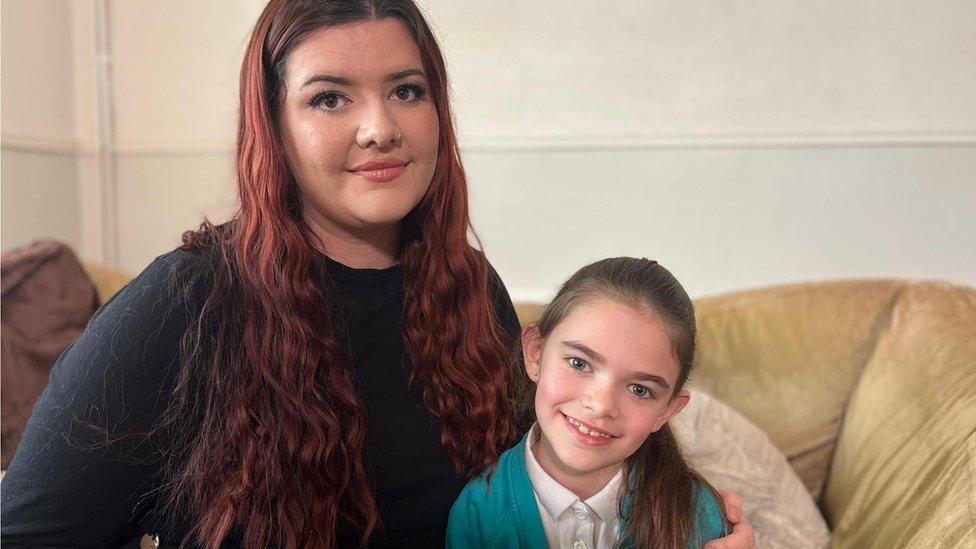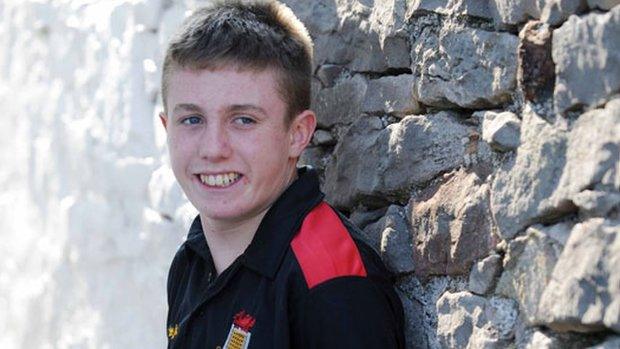Leeds girl, 7, loses sight in one eye as chickenpox sparks rare disease
- Published

Lauren, and her daughter Ruby, now attend regular hospital appointments for tests and check ups
A seven-year-old girl has been left blind in one eye and will need lifelong treatment for an "incredibly rare" disease brought on by chickenpox.
Ruby, from Leeds, has acute disseminated encephalomyelitis (ADEM) which causes swelling on the brain.
Her mum, Lauren, said doctors initially thought it was flu, with Ruby being bed-bound because of the condition.
"It's so hard to see my little girl, who has already struggled so much in her short life, fight again," she said.
The condition was first noticed by Ruby's family a week after she had chickenpox, Lauren said.
After her condition deteriorated on 4 April 2022, Ruby was rushed to hospital where a doctor said it was thought she had conjunctivitis.
"She was screaming in pain with her eyes," Lauren said, with her daughter having a sensitivity to the light.
The chickenpox led to an infection in her brain, which caused swelling brought on by ADEM, doctors have since found.
The NHS said ADEM sees the "immune system becoming mis-programmed", with immune cells attacking healthy nerves.
Since her diagnosis, Ruby has lost the sight in her right eye and some days she struggles to walk.
"There's days when she can't lift her head off the pillow. It's a big change for Ruby in such a short space of time," Lauren said.
Any future flare-ups of ADEM could risk her losing her sight in her left eye, Lauren added.

What is acute disseminated encephalomyelitis (ADEM)?
Acute disseminated encephalomyelitis is a rare inflammatory condition that affects the brain and spinal cord
Symptoms happen quickly over hours
Symptoms include nausea and vomiting, headache, irritability and sleepiness, unsteadiness or inability to walk, problems with vision, weakness or tingling
The symptoms depend on where in the brain or spinal cord the inflammation and swelling is occurring
Source: GOSH/NHS

Ruby will need treatment for the rest of her life and regular doctors' appointments, leaving her parents struggling to come to terms with the condition.
"Selfishly, I'm really angry. We've really, really struggled," Lauren said.
"Over time we will come to terms with it, and it will get better and we are still learning loads about this condition."
She hoped telling Ruby's story would raise awareness of the disease.
Leeds Teaching Hospitals Trust has apologised for the care Ruby initially received.
"We have met with Ruby's family to discuss their concerns and our clinicians have carried out a full review of her care and shared the findings," a spokesperson said.
"Our teams continue to support Ruby and her family with her ongoing healthcare for this incredibly rare condition."
Lauren added: "It's absolutely life-changing. Even thought it's rare, it does happen."

Follow BBC Yorkshire on Facebook, external, Twitter, external and Instagram, external. Send your story ideas to yorkslincs.news@bbc.co.uk, external.
Related topics
- Published23 May 2012
